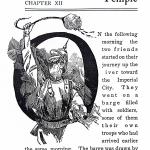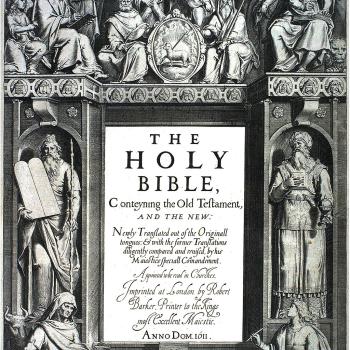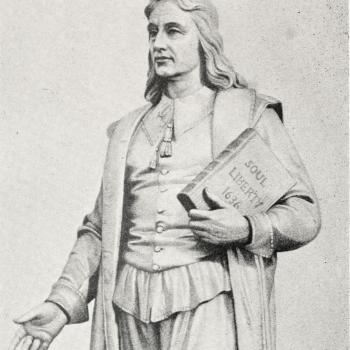When the End of Time comes, it’ll be other Christians who do the persecuting during the Time of Trouble before Jesus’s Second Coming. And the United States will be the nation that helps make this happen, providing the political power for the spiritual force known as the Anti-Christ. This is the story that sums up much of the traditional apocalyptic story for my denomination, the Seventh-day Adventists.
There are more nuanced ways to lay out Adventist eschatology and Biblical interpretation than this, and you can explore those here. But growing up, and now as an adult Adventist, this is still the origin story for my view of the relationship between church and state. It is a story formed by a church coming of age within the United States and assuming many of the political and cultural realities of this country. It is a reminder to me of the chastening effect small, apocalyptic sects can have on Christian dominion dreams and the seduction of cultural and political power. Sectarianism can give useful correctives to Christian nationalism.
Within the British world, demand for political tolerance of smaller Christian communities (never mind non-Christians at this point) became the foundation of religious pluralism. English Catholics, for instance, argued that they could be loyal citizens even though the Protestant state insisted that the pope’s position as head of the church prevented them from committing fully to the English nation. The Christian nation was defined in such a way that excluded them. These Catholics were among the first to insist on parental rights—that they should be allowed to raise their children in their faith without losing custody of them, even though the state disagreed with that faith. While Catholics aren’t often defined as sectarian, within the early modern British world they behaved in a similar fashion to such groups.
Chris Beneke tells the story of religious pluralism moving Beyond Toleration in the territory that became the United States in the eighteenth century. He lays out the way that smaller Christian groups insisted on being treated with more than just basic legal allowance. They didn’t want to be disrespected nor called rude names in the papers. These Christian sectarians wanted inclusion and to be accepted, not just tolerated. It was these small and often quirky groups who forced the United States, still predominantly Protestant, to develop a culture that could handle pluralism.
Small and odd religious groups can help a nation realize that behaviors and ideas they think of as weird and unnecessarily difficult can be integrated into the political community without disintegrating civil society. My own tradition, the Seventh-day Adventists, keep Saturday as Sabbath. We refrain from work/employment, unnecessary commerce and chores, among other activities that vary between individuals and cultural groups. Sometimes this means not competing in sports on Saturdays, not taking exams or doing professional growth on Saturdays, and this is really inconvenient for our colleagues or employers or coaches and teachers.
Adventists who want to be very careful to keep Saturday as a “holy Sabbath” can hear appeals to please not be so difficult or so legalistic or to just adjust to the larger good. This can be painful for those who want to be part of a community and good citizens, but whose conscience does not allow them to participate with what most Christians are doing.
Adventists anticipate a Christian nation enacting worship laws, requiring people in the United States to refrain from work on Sundays, with concomitant punishments for those whose Saturday rest day required them to violate the collective worship time. In fact, in the late nineteenth century, some Adventists were arrested for farming on Sundays due to having taken Saturday off.
When people argue for a “Christian” nation, some of us wonder how one could even define Christianity in a way that could be agreed upon. The entire project of religious toleration was formed because Christian states were enforcing a Christianity that some so-called “difficult” and often annoying (to the majority) small groups could not agree were in fact basic Christian practices or ideals. Core or basic Christianity can be both theological and cultural/ritual, and both have challenges.
As soon as communities decide to write down and define their faith in words they want everyone to agree on (the theological definition), immediately we run into the difficulty of not all expressions working for everyone, and the resulting fights have frequently formed new communities. Concomitantly, if what makes us Christian is a set of agreed-upon practices or cultural assumptions, such as not drinking or dancing, or celebrating Christmas (nor not!!), or having certain sexual practices, then we have challenges extending that faith beyond a particular culture and socio-economic group. The issue can be seen in the United States today around Mormons, or Latter-Day Saints. Are they Christians? Their practices and culture align with many Christians in this country, to the extent that folks can be really comfortable with them. But if/when theological ideas are put front and center, some US Christians resist the idea of defining their group in a way that includes Mormons
The sociologists Malcolm Bull and Keith Lockhart pointed out that Adventists have such a strong set of theo-praxis, especially around Sabbath (although sometimes our health practices also stand out), that we have traditionally been deeply diverse culturally. This is in contrast to most denominations in the United States that are held together by culture, which allows them to assume many elements as being part of their faith that are primarily socio-economic.
When we say something should be Christian in the United States, we think we know what that means. We get frustrated that the Christian part of Christmas isn’t being recognized—without realizing how little our current Christmas celebrations have to do with how Christians practiced their holidays in the past. Many Christians today don’t even celebrate Christmas. Are they not “good” Christians, are they undermining the “traditions” of Christianity and the larger community?
These conflicts are part of why many smaller sectarian Christian groups have looked to the separation of church and state, and even secularism, as a boon to spiritual thriving. Each smaller Christian group has the ability to define its own practice and the parameters under which it will ally with other Christians without the state taking on the promotion of some sort of generic Christianity which turns out to be not so generic after all.
I want to make it clear that I believe in the thriving of other religious and non-religious individuals and groups outside of Christianity, and I like belonging to a nation that allows that. But as a Christian I have found it necessary to explain why I wouldn’t want my government to promote my faith. My church’s heritage in the Radical Reformation and the confrontation with Christian state power is the reason. Seventh-day Adventists aren’t perfect, but we do have a strong arm of advocacy regarding religious liberty and freedom of conscience, and not just for Christians. We consistently argue for the idea that separation of church and state is best for spiritual flourishing. So in an era when Christian nationalism and conservative theology are often appearing to go hand in hand in the USA, I just want to alert the wider world to the sectarian Christian roots for resisting such religious nationalism.
















